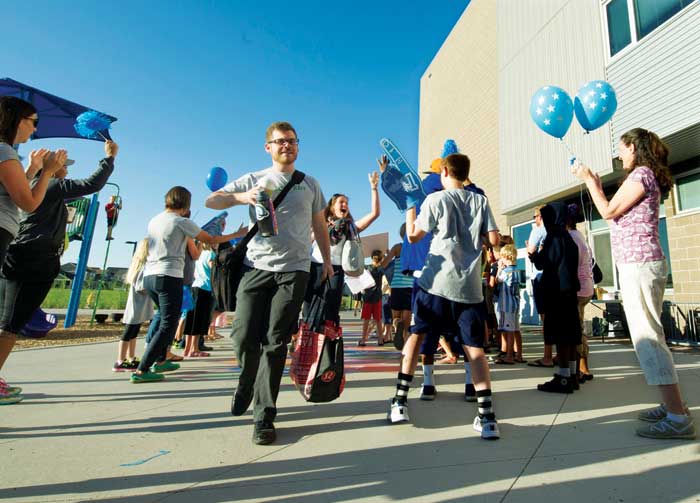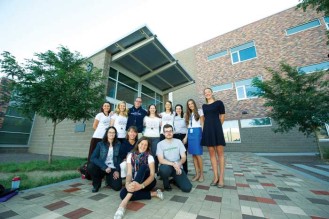
Denver Discovery parents surprised the school’s new staff with a rally to welcome them to their new school. Front Porch photos by Laura Mahony.
Everything is new at Denver Discovery School this year, but the first subject Principal Kristen Atwood talks about is the new school’s parent volunteers. She says they jumped in over the summer and established committees with mission statements and goals; they meet monthly to talk about obstacles and successes, “and then carry on the work and come back a month later. There is no doubt we are where we are now because of those parents.”
Additionally, she says, the passion and expertise of her new teachers are critical parts of the school’s startup and success. Atwood advertised nationally and says she “never looked at where they were from. These were people that called me, sent videos, and were creative about getting their names in front of me. Some were vacationing here and walked into my office. I just hired the person who felt most qualified and aligned with the mission of our school.”
Starting in January Atwood sifted through hundreds of resumes. “That’s what year zero is for a principal who is opening a school,” she says. She screened applicants through phone conversations, people flew in for interviews, and she required each one to teach a lesson in person locally (through an arrangement she made with other principals) or send a 45-minute video of a lesson in front of their class.

Back row: Veronica Fiedler, Special Education; Heidi Cockerille, Language Arts; Ben Kissam, Physical Education; Jenny Sickle, Science; Mandy Abbott, Math; Amy Foote, Visual Arts; Claire Vock, Spanish; Kristen Atwood, Principal. Middle row: Rachel Stutzman, Gifted/Talented Teacher; Martha Turner, Counselor; Michael Windham, Guitar/Orchestra Teacher. Front row: Laura Hoguet, Social Studies.
The outcome was a staff that is 80 percent from out of state. The twelve people who had never before worked together needed to be a cohesive team on day one—so a week and a half before school started, Atwood took them on a two-day outing in the mountains to focus on collaboration, leadership and communication.
The teachers were hired with the understanding that Denver Discovery would be applying for innovation status. They have started meetings to discuss the goals and legalities of innovation and the waivers they will consider. The staff has already come to agreement on their first waiver. All agreed they would like more time for professional training than is possible in the one week before students arrive—so they will have several two-hour sessions by tele-conferencing during the week before they report back to work in the fall.
“Any time we propose a waiver, we’ll lay out the pros and cons and have an open conversation with the whole staff so it’s not a surprise and they have voice in the process as a whole,” says Atwood. By October they will have had eight meetings and will take a staff vote on the plan. In December the Board will vote on their innovation plan.
Small is Beautiful
With a smaller number of students, Atwood says the school can “celebrate the individual and ensure everyone feels valued.” She personally learned about each new student by talking to their fifth grade teachers and visiting them in their homes last spring. And when students came in over the summer to register, the school made a video of each student talking about him/herself. From the videos, each student was already known to the teachers on the first day of school. And in a smaller setting, Atwood adds, discipline is not as much of an issue because of the strong relationships that are formed and nurtured at the school.
In addition, Denver Discovery has smaller class sizes, with 27-28 per class. Atwood says they can keep that size “if we can keep up the fundraising.”
Common Core
Common Core is a focus for all principals this year, not just new ones. Atwood says the first step toward getting students ready for the new online testing based on Common Core standards is to get a laptop in every child’s hand and be sure every student is comfortable with the mechanics required by the test (using the mouse, scrolling, typing in a box, etc). Next she says it’s critical that the teachers understand exactly what’s involved in the problem solving process in the new tests. She had her teachers divide into groups of three to chart every step they needed to go through to solve a sample problem, identifying every academic or technological obstacle that may exist for students.
“We document, skill by skill, what the kids will have to be able to do. Those become our stepping stones to what we’re going to do in a chronological fashion in the classroom to be sure our kids are prepared.” Denver Discovery students will take their first practice online assessment the end of September, with a focus on the technology of the test. Two future practice tests will focus on more complex skills and knowledge. The actual tests will be given in March and May.
With the new tests, Atwood says, “There’s a lot more problem solving and there’s a lot more deep critical thinking skills that are expected from our kids.” She says part of the reason Denver Discovery School uses project-based learning is the problem solving and critical thinking skills students develop as multiple contents are blended in one project. One of the first projects, creating earthquake sustainable structures, will use cross-curricular learning between math and science.




0 Comments